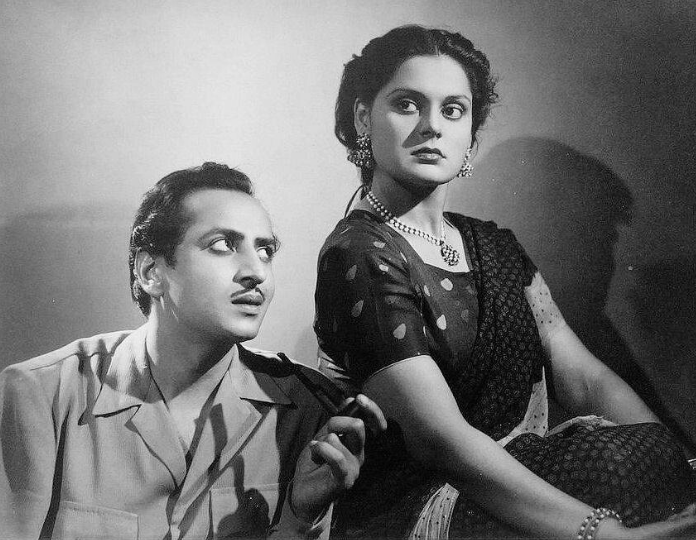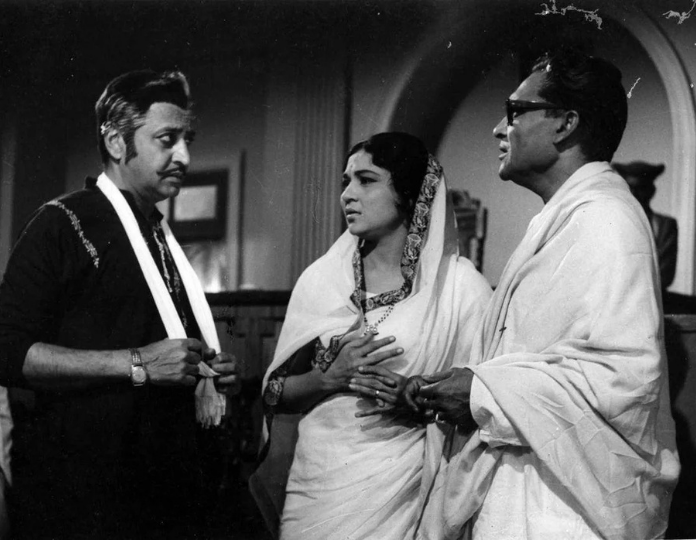Pran Krishan Sikand Ahluwalia, better known by his mononym Pran, was one of the most versatile and respected actors in the history of Indian cinema. He was known for his memorable roles as a villain and a character actor in Hindi films from the 1940s to the 1990s. In his career of over five decades, Pran appeared in over 362 films. He was also one of the highest-paid actors of his time.
Early Life and Debut
Pran was born on February 12, 1920, in Lahore. His father was a civil engineer and a government contractor, and his mother was a homemaker. Pran has had a passion for photography and football since his childhood. He studied in various schools in Lahore, Peshawar, and Kapurthala and completed his matriculation from Hamid School, Rampur (U.P.). He also attended Aitchison College, Lahore, for a year.
Pran started his acting career with a small role in the Punjabi film “Yamla Jat” (1941). He followed it by films like “Chaudhary” and “Khajanchi” in 1941. In 1942, he acted in his first Hindi film, Khandaan (1942), opposite Noor Jehan. His other notable films in this period include Kaise Kahoon (1945) and Khamosh Nigahen (1946).
Pran Moved To Bombay

After partition, Pran left Lahore and moved to Bombay. It was a very difficult time for a lot of people. His friends “Saadat Hasan Manto and Shyam” helped him get the film “Ziddi,” also starring Dev Anand and Kamini Kaushal, written by Ismat Chughtai and directed by Shaheed Latif. Ironically, Manto also had to leave Bombay for Pakistan.
He gained fame as a villain after his performance in Ziddi, followed by M. Yusuf’s Grihasti (1948), Bari Behan (1949), Prabhat Films’s Apradhi (1949), and Wali Mohammad’s Putli (1949).
Pran established himself as the most popular and successful villain in Hindi cinema in the 1950s and 1960s. He played a variety of negative characters, such as gangsters, smugglers, dacoits, rapists, murderers, traitors, and spies. Pran was known for his distinctive voice, mannerisms, expressions, and often used different accents and dialects to suit his roles. He also experimented with his looks and tried countless hair styls, wigs and facial hair styls.
He Redefine The Negative
Some of his iconic villainous roles were in films like Sheesh Mahal (1950), Aah (1953), Jashan (1955), which is known for his chemistry with Kuldip Kaur, Munimji (1955), Amar Deep (1958), Adalat (1958), Chori Chori (1956), Jagte Raho (1956), Chhalia (1960), Jis Desh Mein Ganga Behti Hai (1960), and Dil Hi Toh Hai (1963), Shaheed (1965), Johny Mera Naam (1970), Joshila (1973), Warrant (1975), and Des Pardes (1978).
He had an iconic pairing with Dilip Kumar; together, they have done many films. Some of their films include Azaad (1955), Devdas (1955), Madhumati (1958), Dil Diya Dard Liya (1966), Ram Aur Shyam (1967), Aadmi (1968), Duniya (1984), Dharm Adhikari, and others. Pran and Ashok Kumar also shared a deep friendship both on and off-screen. They did 27 films from 1951 to 1987, starting with Afsana (1951), Mr. X (1957), Adhikar (1971), Victoria No. 203 (1972), Chori Mera Kaam (1975), and Raja Aur Rana (1984), among others.
The Versatility
Pran also proved his versatility as a character actor in the later years of his career. He played positive and comic roles with equal ease and flair. Be it a loyal friend, a loving father, a benevolent brother, a humorous uncle, or a patriotic citizen, Pran was always pitch-perfect. Pran took on the role of Malang Chacha, a seasoned war hero, in Manoj Kumar‘s 1967 film Upkar. The popular song “Kasme Waade Pyaar Wafaa” by Kalyanji Anandji was picturized on him in the movie.
Some of his notable character roles were in films like Aansoo Ban Gaye Phool (1969), Purab Aur Paschim (1970), Victoria No. 203 (1972), Be-Imaan (1972), Majboor (1974), Amar Akbar Anthony (1977), Don (1978), Sharaabi (1984), and Duniya (1984).
Pran received many awards and honors in his career. He won the Filmfare Award for Best Supporting Actor three times: for Upkar (1967), Aansoo Ban Gaye Phool (1969), and Be-Imaan (1972). Pran refused to accept his Best Supporting Actor award for Be-Imaan. He was protesting against the decision of not awarding Pakeezah for Best music. He was of the view that the Best Music should have gone to Ghulam Haidar for Pakeezah and not Shankar Jaikishan for Be-Imaan.
The famous songs “Yari Hai Iman Mera” from Zanjeer, “Hum Bolega To Bologe Ke Bolta Hai” from Kasauti (1974), and “Micheal Daru Peeke Dandha Kartha Hai” from Majboor (1974), which were picturized on Pran, are still very popular.
The Greatest Character Actor
Pran has done about 14 films with Amitabh Bachchan, including Zanjeer (1973), where he played fan favorite Sher Khan; Majboor (1974); Don (1978); Amar Akbar Anthony (1977); Dostana (1980); Kaalia (1981); Naseeb (1981); Andha Kanoon (1983); Nastik (1983); Sharaabi (1984); Shahenshah (1988); Jaadugar (1989); and Toofan (1989). Amitabh Bachchan specially requested Pran Sab to be a part of his home production, Tere Mere Sapne (1996).
In the 1980s, some of his notable films include Karz (1980), Khoon Ka Rishta (1981), Krodhi (1981), Jeeo Aur Jeene Do (1982), Souten (1983), Raja Aur Rana (1984), Raaj Tilak (1984), Duniya (1984), Sohni Mahiwal (1984), Dharm Adhikari (1986), Imaandar (1987), Sherni (1988), Bade Ghar Ki Beti (1989), Nigahen (1989), and many more. One of his most notable roles came in 1992, when he appeared in Sawan Kumar Tak’s Sanam Bewafa, starring Salman Khan, Chandani, and Danny Denzongpa. His dialogue, “Amma Saayin,” is still remembered by cinephiles.


He got the Filmfare Lifetime Achievement Award in 1997. Pran gets the Padma Bhushan in 2001 and the Dadasaheb Phalke Award in 2013 for his contributions to the arts. Stardust magazine named him the “Villain of the Millennium” in 2000.
Later Years
Pran married Shukla Ahluwalia, whom he married in 1945. The couple had three children: Arvind Sikand Ahluwalia, Sunil Sikand Ahluwalia, and Pinky Sikand Ahluwalia. Pran died on July 12, 2013, at the age of 93 due to old age. He was suffering from a prolonged illness in Mumbai’s Lilavati Hospital.
In 2000, film journalist Bunny Reuben penned his biography titled “…and Pran.” The title was inspired by the unique credit sequence in Pran’s movies. In films, his name consistently appeared last, following all the other actors, creating a distinctive signature: “…and Pran.”
Pran on IMDB














Leave feedback about this